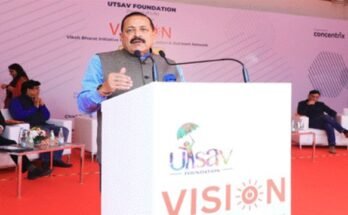India has the fifth largest power generation portfolio worldwide but most of the discussions, plans and policies around this sector remain limited to generation, transmission and distribution of power. However, senior executives from leading public and private power companies gathered at the 6th Power HR Round Table organized by the Corporate Relations department of UPES to deliberate on ‘Measuring ROI in HR’.
In his inaugural address Rajeev Bhadauria, Director, Group HR at Jindal Steel and Power Ltd. commented, “Measuring ROI of human resource is as much an art as it is a science but it needs to be measured in the right context as no matter how much organizations get dependent on technology, it cannot replace employees. Human endeavor has the ability to dynamically change the world of tomorrow.”
Mr. Jaidit Singh Brar, Senior Partner at McKinsey and Co., while moderating a CEO panel discussion said “Talent management and HR continue to be top priorities for companies. Agile companies with high employee engagement tend to perform better.”
During the discussion Praveer Sinha, CEO & Managing Director, Tata Power Delhi Distribution Ltd. opined that ‘Organizations should see investment in human resources as a social responsibility and not measure ROI because technology alone cannot deliver your business.’
Others who spoke at the round table were officials from BSES Rajdhani & Yamuna Power Ltd., Lanco Infratech, NTPC and Sembcorp Industries. Ltd., Saviour US Inc and Jindal Steel & Power Ltd.
They agreed that the power sector needs to invest in training, skilling, equipping and re-skilling the workforce. The development process needs to become consumer-centric with innovations and bench-markings that promote entrepreneurship.
In an earlier report titled ‘Powering India: The Road to 2017’, McKinsey & Co. emphasizes on skilled manpower to overcome operational inefficiencies faced by the Indian Power sector. According to the report resolving the severe shortages in manpower will require a host of new training and development service providers. The government can help by strengthening technical institutes, setting up certification standards for a range of roles, enabling public-sector companies to expand their training programmes and encouraging new entrants into training and development. The report also estimates that there is a need to train and develop 300,000 skilled and semi-skilled workers for the power sector.
Mr. Utpal Ghosh, CEO and President of UPES emphasized on strong industry-academia connect for educational institutes to train and skill resources as per changing requirements of the sector, which is fast moving towards renewable energy from fossilized fuel.
The event also witnessed a short movie by Mr. Tony Seba, Lecturer, Stanford University on “Why current and energy and transportation systems will be obsolete by 2030.”
Note: News shared for public awareness with reference from the information provided at online news portals.



